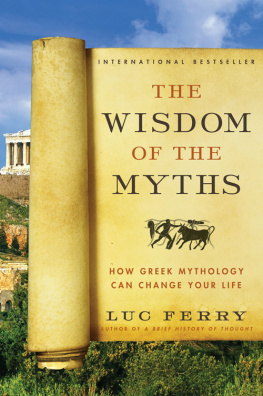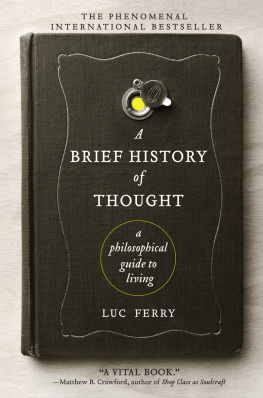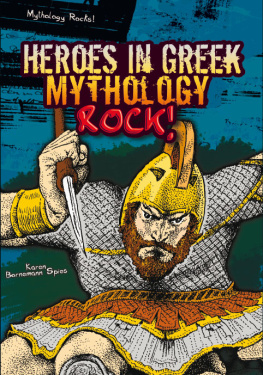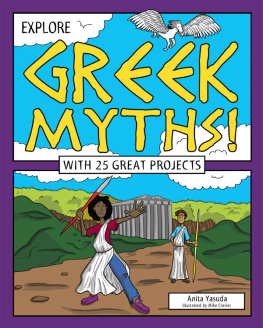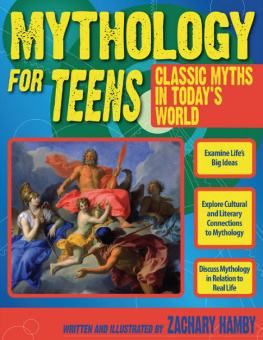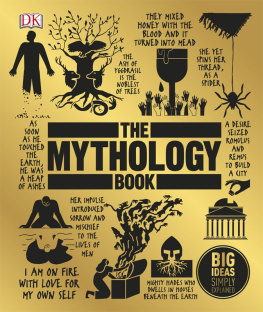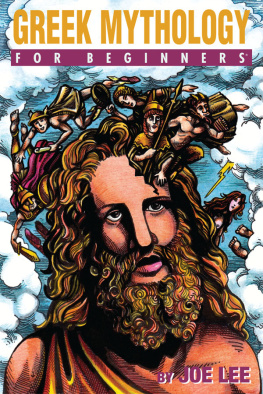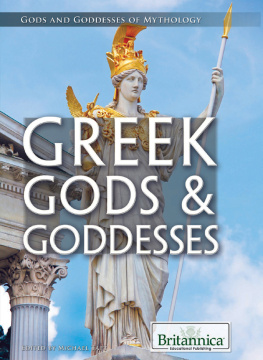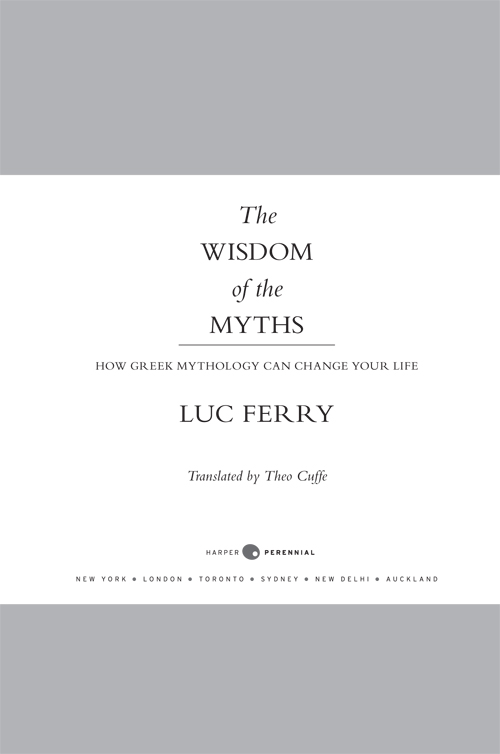for Moune, one and only
Contents
L et us begin with beginnings: What is the underlying purpose of the Greek myths, and why todaymore than ever, perhapsshould we pay attention to them? I believe the answer lies in a single passage of what is perhaps the most celebrated work of ancient Greece, the Odyssey of Homer, in which we see clearly the extent to which mythology is not what we so often think of it as being: an accumulation of tales and legends, a collection of anecdotes more or less fantastical, whose sole end is to amuse us. Far from being reducible to literary entertainment, mythology is at the core of ancient wisdom, the foundation for that great edifice of Greek philosophy that would subsequently sketch out, in conceptual form, the blueprint of a successful life for human kind, mortal as we are.
Let us allow ourselves to be carried along for a moment on the tide of Homers story, whose broad outlines I recall here but which we shall have reason to revisit later on.
After ten long years of absence fighting the Trojans, OdysseusGreek hero par excellencehas won the day by cunning, thanks, of course, to the famous wooden horse that he left so ambiguously on the beach, outside the city ramparts. It is the Trojans themselves who wheel it into their citadel, otherwise unassailable for the Greeks. They take it to be an offering to the gods, whereas it is a war machine whose ribs are packed with soldiers. Night falls; the Greek warriors emerge from the belly of this imposing statue and proceed to massacre the sleeping Trojans, down to the last man, more or less. It is an appalling and merciless carnagepillage so dreadful as to excite even the anger of the gods. But at least the war is now over. Odysseus can think of returning home, to his island, Ithaca; to his wife, Penelope; his son, Telemachusin short, he can reassume his place in the family and at the heart of the kingdom. We observe, already, that before reaching its destination in this harmonious fashion, in peaceful reconciliation with things as they are, the existence of Odysseuslike that of the universe as a wholebegins in chaos. The terrible war in which he has taken part, which has forced him unwillingly to quit the natural place he occupied beside his loved ones, takes place under the auspices of Eris, goddess of strife and discord. It is on her account that enmity first took root between Greeks and Trojansand it is in the perspective of this initial conflict that the heros itinerary must be placed, if we are to grasp its significance as wisdom literature.
The dispute erupts over a marriage: that of the future parents of Achilles, himself a Greek hero and one of the major protagonists of the Trojan War. As in the tale of Sleeping Beauty, everyone has forgotten to invite the wicked stepmotheror rather Eris, who plays that role in this story. This is to say that they deliberately pass over her on this festive occasion: wherever she appears everything is sure to turn to gall; sooner or later, hatred and anger always manage to prevail over love and joy. Naturally, Eris the uninvited turns up, intent on disturbing the proceedings. She comes fully armedwith an apple, which she casts onto the table where the newlyweds are feasting, surrounded for the occasion by the principal gods of Olympus. On this magnificent golden apple are inscribed the words For the fairest! As is to be expected, all of the women present exclaim in unison: Its mine!and the conflict insinuates itself, slowly but surely, that will in due course spark the Trojan War.
And here is how.
Around the banquet table are seated three magnificent goddesses, all equally precious to Zeus, ruler of the gods. Firstly Hera (Juno, in Latin), his immortal wife, to whom he can refuse nothing. But also present are his favorite daughter, Athena (Minerva), and his aunt Aphrodite (Venus), goddess of love and of beauty. As is to be expected, Eriss plot works its course, and the three women all claim the golden apple. Zeus, as head of the family, refrains as far as possible from taking sides in the quarrel: he is well aware that, having to choose between his daughter, his wife, and his aunt, he would have no peace.... Moreover, he must act impartially, and whatever his choice, he will be accused of prejudice by those he rules against. So he sends his faithful messenger, Hermes (Mercury), to discreetly seek out some young innocent to adjudicate between the three beauties. At first sight the young man in question appears to be a Trojan shepherdbut is in reality none other than Paris, one of the sons of Priam, king of Troy. Paris was abandoned at birth because an oracle predicted that he would cause the destruction of his native city. But he was rescued in the nick of time, and his life saved by a shepherd. The latter took pity on this infant and raised him to be the handsome adolescent who now stands before them. So in the guise of a young peasant there is concealed a Trojan prince. With the ingenuousness of youth, Paris accepts the role of judge.
Each of the women, to claim his attention and secure the famous apple of discord, promises Paris something corresponding to what she is herself. Hera, who reigns by the side of Zeus over the greatest of empiresnamely the entire universepromises, if he chooses her, that he likewise will rule over all earthly lands and have preeminent wealth. Athena, goddess of intelligence, of the arts, and of warfare, promises that if she emerges victorious he will be conqueror in every battle. As for Aphrodite, she whispers to him that with her help he can seduce the most beautiful woman in the world.... Paris, of course, decides in favor of Aphrodite. And then discovers, to the misery of mortals everywhere, that the most beautiful woman in the world is in fact married to a Greeknot merely a Greek, but Menelaus, king of Sparta, the most warlike of all cities. She is called Helen, the famous belle Hlne to whom poets, composers, and chefs have continued to pay tribute down the ages. Eris has attained her objective: a Trojan prince, Paris, charmed by Aphrodite, abducts the beautiful Helen from Menelaus, and the inevitable war between Trojans and Greeks is unleashed a few years later....
And poor Odysseus will be forced to play his part in it. The Greek kingsof whom Odysseus is one, since he rules over Ithacahave in effect taken an oath to uphold the marriage rights of whoever marries Helen. Her beauty and charms are such, it is feared that jealousy on her account, fueled by hatred, will sow discord between the kings. They have therefore sworn allegiance to whomever Helen selects. Menelaus being the chosen one, all the others must, in the event of any betrayal, come to his assistance. Odysseus, whose wife, Penelope, has just given birth to little Telemachus, does all he can to avoid this war. He pretends to be demented, he plows his fields back to front, he sows pebbles instead of good grainbut his ruse fails to deceive the wise old sage who is dispatched to seek him out, and in the end Odysseus must resign himself to sailing with the others. For ten long years he is separated from his natural place, from his world, from his home in the universe, from his loved onesdedicated to conflict and discord rather than to harmony and peace. Once the war is over, he has but one idea in his head: he wants to get home. But his troubles are only beginning. His return voyage will last ten long years and will be full of pitfalls: almost insurmountable trials that suggest that an ordered existence, personal salvation, and the path to wisdom are not to be taken for granted in this world. We have to earn them, at the risk sometimes of life itself. It is at the very outset of his return voyagehis journey from war toward peacethat the episode that now concerns us takes place.

